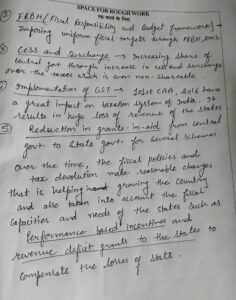Examine the Inter-State Council’s contribution to the advancement of cooperative federalism in India critically. (125 Words) [UPPSC 2020]
Model Answer Introduction Financial Emergency, outlined in Article 360 of the Indian Constitution, is one of the three emergencies the President of India can proclaim. Notably, it has never been imposed in independent India. This provision aims to safeguard the nation’s financial stability and crediRead more
Model Answer
Introduction
Financial Emergency, outlined in Article 360 of the Indian Constitution, is one of the three emergencies the President of India can proclaim. Notably, it has never been imposed in independent India. This provision aims to safeguard the nation’s financial stability and creditworthiness during critical situations.
Circumstances for Proclaiming Financial Emergency
According to Article 360, the President may declare a Financial Emergency if they believe that the financial stability or credit of India—or any part thereof—is under threat. This could occur due to various factors, such as:
- Severe fiscal deficits that jeopardize government operations.
- Economic shocks, such as a sharp decline in GDP or global financial crises.
- Insolvency issues affecting key state or central government institutions.
These circumstances necessitate immediate intervention to prevent further economic decline.
Consequences of Financial Emergency
The declaration of a Financial Emergency triggers several important consequences:
- Executive Authority: The central government gains extensive powers to direct states on financial propriety. This includes issuing instructions to ensure compliance with financial norms and regulations.
- Reduction of Salaries: The President can reduce the salaries and allowances of all Central and State government employees, including judges of the Supreme and High Courts. This measure aims to control public expenditure during financial distress.
- Legislative Implications: All Money Bills and financial legislation passed by State Legislatures must be reserved for the President’s consideration. Additionally, the President can direct reductions in salaries for Members of Parliament (MPs) and Members of Legislative Assemblies (MLAs).
- Suspension of Fundamental Rights: While not explicitly stated, the enforcement of the Directive Principles of State Policy may take precedence over Fundamental Rights during a Financial Emergency, allowing for stricter governance measures.
Conclusion
Understanding the provisions and implications of Financial Emergency is vital for grasping the constitutional mechanisms in place to address financial crises in India. While it has never been invoked, the potential consequences could significantly affect government functioning and the economy, emphasizing the need for careful management of public finances.
See less


Role of the Inter-State Council in Promoting Co-operative Federalism 1. Purpose and Function: The Inter-State Council (ISC) was established under Article 263 of the Indian Constitution to promote co-operative federalism by facilitating dialogue between the Centre and states on issues of mutual conceRead more
Role of the Inter-State Council in Promoting Co-operative Federalism
1. Purpose and Function:
The Inter-State Council (ISC) was established under Article 263 of the Indian Constitution to promote co-operative federalism by facilitating dialogue between the Centre and states on issues of mutual concern. Its main role is to resolve disputes and coordinate policies.
2. Achievements:
The ISC has played a role in policy coordination, such as discussions on GST implementation and flood management. It serves as a platform for states and central government to address inter-state issues and ensure collaborative governance.
3. Criticisms:
However, its effectiveness has been questioned due to infrequent meetings and limited impact on major federal disputes. For instance, it had a limited role in the recent farm laws dispute, highlighting its ineffectiveness in resolving critical issues.
4. Recent Example:
In the context of COVID-19 management, while the ISC discussed various measures, state-central coordination often remained ad-hoc rather than systematically resolved through the council.
Conclusion:
See lessThe ISC aims to foster co-operative federalism, but its limited frequency and variable impact suggest the need for a more dynamic role in ensuring effective federal collaboration.